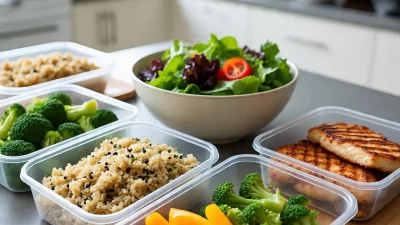In the world of weight loss, the debate between Keto vs. Low-Carb diets continues to gain momentum. With millions of success stories linked to both approaches, it’s no surprise that people are left wondering: Which one is truly more effective?
In this comprehensive guide, we’ll break down the key differences, benefits, drawbacks, and practical tips for choosing between Keto vs Low-Carb for sustainable fat loss. Whether you’re a busy mom, a working professional, or someone just starting their wellness journey, this article will help you make an informed decision.
Contents
- 1 What’s the Difference Between Keto vs Low-Carb Diets?
- 2 Keto vs. Low-Carb: How Each Affects Weight Loss
- 3 Keto vs. Low-Carb: Which Is Easier to Stick To?
- 4 Keto vs Low-Carb: Pros and Cons at a Glance
- 5 Who Should Choose Keto?
- 6 Who Should Choose Low-Carb?
- 7 Sample 7-Day Meal Plan: Keto vs. Low-Carb
- 8 Keto vs Low-Carb: What the Research Says
- 9 Keto vs. Low-Carb and Exercise Performance
- 10 Common Mistakes When Choosing Keto vs. Low-Carb
- 11 Tips for Success: Keto vs. Low-Carb Edition
- 12 Final Thoughts: Which One Should You Choose?
- 13 FAQ
What’s the Difference Between Keto vs Low-Carb Diets?
Before comparing results, it’s crucial to understand what separates Keto vs. Low-Carb diets in theory and practice.
Keto Diet Explained
The ketogenic diet is a very low-carbohydrate, high-fat, moderate-protein diet. The goal is to shift your body into a state called ketosis, where it burns fat for fuel instead of glucose.
- Carbs: Typically limited to 20–50 grams per day.
- Fats: Make up around 70-75% of total daily calories.
- Protein: Around 20-25%.
Once in ketosis, your body becomes a fat-burning machine. It produces ketones from fat, which serve as an alternative energy source.
Low-Carb Diet Overview
A low-carb diet is more flexible. It reduces carbohydrate intake but doesn’t necessarily aim for ketosis.
- Carbs: Range from 50–150 grams daily.
- Fats and Proteins: Can be adjusted based on your goals.
While both diets reduce carbs, Keto vs Low-Carb diets differ drastically in how strict they are and how your body responds.
Read : Best Low-Calorie Foods That Keep You Full and Help Burn Fat
Keto vs. Low-Carb: How Each Affects Weight Loss
Fat Burning Efficiency
- Keto: By eliminating nearly all carbs, your body is forced into ketosis, making it highly efficient at burning fat—both dietary and stored.
- Low-Carb: Still encourages fat burning but also allows the body to use glucose from occasional carb intake.
Appetite Suppression
One of the key benefits of Keto vs. Low-Carb is how both can naturally reduce hunger.
- Keto’s high fat intake often leads to increased satiety and fewer cravings.
- Low-carb diets, especially those with adequate protein, can also curb appetite but may not eliminate carb cravings completely.
Blood Sugar and Insulin
Both diets reduce blood sugar spikes, but the Keto diet tends to have a more profound effect on insulin sensitivity.
- This makes Keto vs Low-Carb especially important for people with prediabetes or type 2 diabetes.
Keto vs. Low-Carb: Which Is Easier to Stick To?
Adherence is critical when it comes to weight loss success.
Keto Challenges
- Requires strict tracking.
- Difficult when eating out or traveling.
- Side effects (keto flu, fatigue, constipation) during adaptation phase.
Low-Carb Advantages
- More food variety.
- Easier to sustain long-term.
- Allows occasional indulgences without throwing you off track.
When evaluating Keto vs Low-Carb, sustainability plays a huge role. For many people, low-carb may be easier to follow in the long run.
Keto vs Low-Carb: Pros and Cons at a Glance
| Feature | Keto | Low-Carb |
|---|---|---|
| Carbs | <50g/day | 50-150g/day |
| Ketosis | Yes | Not required |
| Flexibility | Low | High |
| Hunger Control | Strong | Moderate to strong |
| Adaptation Symptoms | Common | Rare |
| Long-Term Sustainability | Moderate | High |
Who Should Choose Keto?
The Keto diet may be a better fit if:
- You want fast initial weight loss.
- You’re targeting stubborn fat.
- You have insulin resistance or metabolic syndrome.
- You enjoy high-fat foods and don’t mind restricting carbs.
People who thrive on routine and strict rules may do better with Keto vs. Low-Carb approaches that allow more flexibility.
Who Should Choose Low-Carb?
A low-carb diet may be better if:
- You prefer a balanced, less-restrictive approach.
- You want to improve your eating habits slowly.
- You exercise regularly and need carbs to fuel workouts.
- You want to enjoy fruits, legumes, or whole grains occasionally.
When it comes to Keto vs. Low-Carb, active individuals often perform better with some carbs in their system.
Sample 7-Day Meal Plan: Keto vs. Low-Carb
Let’s compare what a week might look like on both plans.
Keto Meal Plan Example
Day 1:
- Breakfast: Scrambled eggs with spinach and cheddar
- Lunch: Cobb salad with avocado and blue cheese
- Dinner: Grilled salmon with zucchini noodles
Day 2:
- Breakfast: Bulletproof coffee and boiled eggs
- Lunch: Tuna salad in lettuce wraps
- Dinner: Chicken thighs with cauliflower mash
…and so on.
Low-Carb Meal Plan Example
Day 1:
- Breakfast: Greek yogurt with berries and chia seeds
- Lunch: Turkey and hummus wrap with low-carb tortilla
- Dinner: Stir-fry with lean beef and brown rice (½ cup)
Day 2:
- Breakfast: Cottage cheese with sliced peaches
- Lunch: Grilled chicken salad with balsamic dressing
- Dinner: Baked cod with roasted sweet potatoes
The Keto vs. Low-Carb comparison becomes clearer when you look at your plate. The low-carb version allows for more flexibility and familiar ingredients.
Keto vs Low-Carb: What the Research Says
Multiple studies have evaluated Keto vs. Low-Carb for weight loss.
Keto Research Findings
- A 2020 meta-analysis found keto diets lead to faster short-term fat loss.
- May reduce hunger hormones like ghrelin.
Low-Carb Research Findings
- Proven effective for gradual, sustainable weight loss.
- Better adherence long-term in most populations.
The verdict? Keto vs Low-Carb both work—but the best option depends on your health profile and personal preference.
Keto vs. Low-Carb and Exercise Performance
Keto
- May hinder high-intensity workouts due to lack of quick glucose.
- Favoured for endurance training after keto-adaptation.
Low-Carb
- Allows higher energy availability for strength training.
- Ideal for active individuals who need carbs for recovery.
So in the context of Keto vs Low-Carb, athletes or gym-goers might do better on a moderate-carb diet.
Common Mistakes When Choosing Keto vs. Low-Carb
On Keto:
- Not eating enough fat.
- Eating processed “keto” products full of additives.
- Ignoring electrolyte needs (leading to fatigue and cramps).
On Low-Carb:
- Cutting carbs too drastically without adding enough fat or protein.
- Overeating high-calorie “low-carb” snacks.
- Not planning balanced meals.
Avoid these pitfalls, and your Keto vs. Low-Carb journey will be far more successful.
Tips for Success: Keto vs. Low-Carb Edition
1. Plan Meals Ahead: Both diets require preparation. Batch cooking and planning helps avoid carb-heavy temptations.
2. Read Labels: Look out for hidden sugars and starches, especially in sauces and dressings.
3. Stay Hydrated: Water helps manage cravings and prevents dehydration, especially on Keto.
4. Monitor Your Progress: Track your meals, weight, and how you feel. Adjust as necessary.
These principles apply whether you choose Keto vs Low-Carb for your weight loss approach.
Final Thoughts: Which One Should You Choose?
So, which is better for weight loss: Keto vs. Low-Carb?
The truth is, both diets can work if followed correctly. Your decision should depend on your lifestyle, food preferences, and long-term goals.
- Choose Keto if you want rapid results, don’t mind restrictions, and love high-fat meals.
- Choose Low-Carb if you value flexibility, need moderate carbs for activity, and want sustainable weight loss.
Remember, the best diet isn’t the trendiest one—it’s the one you can stick to.
FAQ
What’s the difference between keto and low-carb diets?
The keto diet is a very low-carb, high-fat plan that puts your body into ketosis, where it burns fat for fuel. A low-carb diet reduces carbs but doesn’t aim for ketosis, allowing more flexibility in food choices.
Which diet is more effective for weight loss—keto or low-carb?
Both can promote weight loss by reducing insulin levels and appetite. However, keto may lead to faster initial weight loss, while low-carb is often easier to maintain long-term for many people.
Is the keto diet safe for long-term use?
The keto diet can be effective short-term, but long-term use may lead to nutrient deficiencies or increased cholesterol levels for some. It’s best to follow under medical supervision if used for extended periods.
Can you build muscle on a low-carb or keto diet?
Yes, with adequate protein intake and strength training, you can build muscle on both diets. However, performance may dip initially on keto until your body adapts to fat as a primary fuel source.
Which diet is easier to stick to: keto or low-carb?
Most people find low-carb diets more sustainable because they offer more variety and flexibility, making it easier to enjoy social meals and maintain long-term adherence.


